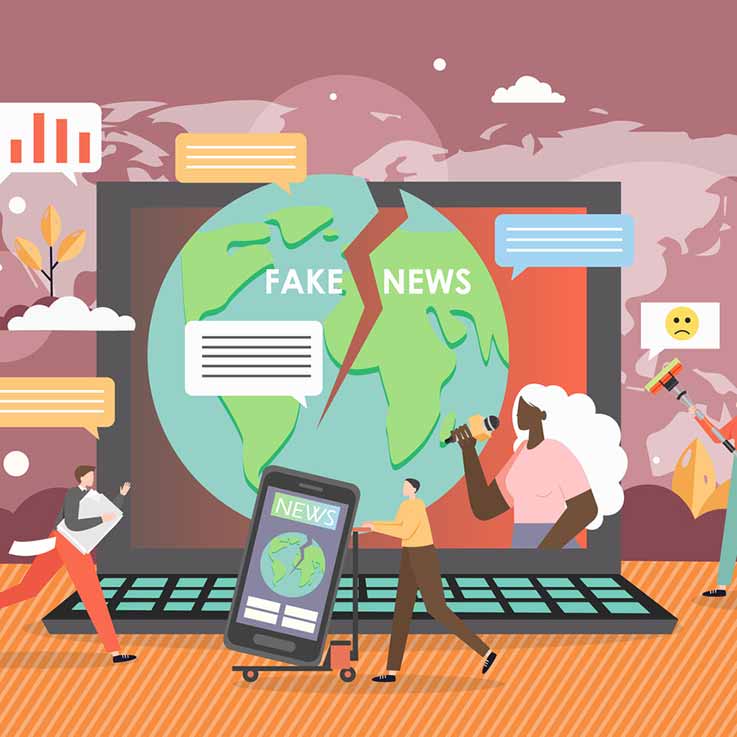
What is media literacy?
According to Trilling & Fadel (2009) media literacy “refers to the medium of delivering messages…, the crafting of the message for a particular medium,… and the impacts the media message has on an audience” (p. 66). Adapting these skills provides individuals a framework to “access, analyze, evaluate, and create messages in a variety of forms, build an understanding of the role of media in society, as well as develop the essential skills of inquiry and self-expression” (Trilling & Fadel, 2009, p. 66). The media has a wide range of platforms that allows individuals to retain information. People can retain content by photographs, videos, web sites, podcasts, etc.
Why is it important?
The importance of media literacy is to provide individuals with skills that allow them to analyze and create media products (Trilling & Fadel, 2009, p. 66). Media literacy allows individuals to have an abundance of information to engage with and verify the truth and to ensure that readers are taking away the correct information from media literacy.
Why is it dismissed?
The challenge with media literacy is that media is widespread so it makes it very difficult to ensure that the media information is correct. It is very easy to have bias in media literacy and this can alternate the readers views. The issue with this as nowadays it is very easy to have information to back up any point of view, even if it is incorrect. I don’t necessarily think it should be dismissed but the internet should be filtering information and media users should be taught more about media literacy.
Why should you aim for varied views but the factual consensus in your PLN?
You should aim for varied views so we know what factual sources to gravitate towards. Almost everyone on the planet has access to posting on social media. A lot of the time the information that is shared is false and has no academic knowledge. As media grows it is going to make it more challenging to distinguish what is “meaningful or true” (Miller, 2021) on social media. Even sources we view as being a reliable source such as the news will stretch out the truth. Julie Smith points out that she has a theory “that we would be better with 10 minutes of news a day, rather than 24 hours” (Miller, 2021). Even the trustworthy news source will expand stories just so they can fill up more camera space and make money. It is already difficult to distinguish incorrect information from the truth. I cannot imagine in 50 years what media literacy will look like and what sources people will be receiving their information from.
This week I interacted with Yuqing and Zhefu blog posts!
References
Miller, Jesse. (2021). EDCI 338- MEDIA LITERACY with JULIE SMITH. YouTube.
Trilling, B & Fadel, C (2012). Digital Literacy Skills . Media Literacy Chapter 4
pp.66. https://learning-oreilly-com.ezproxy.library.uvic.ca/library
/view/21st-century-skills/9780470475386/fade_9780470475386_oeb_c04_r1.html
November 13, 2021 at 3:18 am
Hi kyla, Your blog has a very clear structure and I strongly agree with your points. We all agree that a lot of times the information shared is not necessarily true because almost everyone on the planet can post on social media. So we need to develop and improve our media literacy and critical thinking.
November 21, 2021 at 7:40 pm
Hi Zhefu!
Thanks for leaving a comment on my blog post this week! I appreciate your kind words and I’m glad we share a similar perspective towards information that is shared online.
November 13, 2021 at 10:29 pm
Hi Kyla,
Great Blog Post. I liked your comment about how everyone on the planet can have social media which can lead to a lot of false information with no academic knowledge being shared. This is so important to remember when we are trying to decipher between what information is true and what isn’t on our PLN’s. I do believe though that this can be a good and a bad thing where we can either share some great diverse information, or we can have a lot of misinformation in our PLN. This is why it is always important to check to ensure the information you are sharing is valid.
I also liked Julie’s comment about how a shorter news story would be better than getting news all day. The news stories expand the information so much even that it can be difficult to even find the truth in all of those stories.
November 21, 2021 at 7:42 pm
Hi Ashton!
Thank you! Definitely agree with you on it being both a good and bad thing! But yes, exactly! it’s very important to ensure the information you are retrieving is accurate and reliable.
November 14, 2021 at 4:47 pm
Hi Kyla!
Thank you for bringing up the point that even trustworthy news outlets can have bias. You note that they commonly expand stories more than necessary in order capitalize more on the story. It is a scary thought to know that seemingly “reliable” sources can contain bias, and therefore highlights the need to develop media literacy skills from a young age to be able to correctly distinguish truthful sources of information. Great post Kyla!
Caitlin Galbraith
November 21, 2021 at 7:44 pm
Hi Caitlin!
Thanks for responding to my blog post and leaving such positive and nice feedback! 🙂
November 29, 2021 at 12:56 pm
Hi Kyla. This post does a great job of pointing out how social media can become a vehicle for the dissemination of false information. It is so easy to succumb to the lazy impulse of reading only the headlines and not performing an investigation on our own, which makes media literacy a crucial skill. Thank you!
December 5, 2021 at 5:10 pm
Hi Chole!
Thank your for taking the time to respond to my blog post this week! Definetly agree with you that it is important to have media literacy as a cruicial skill!